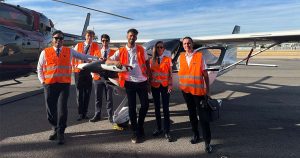
Demystifying Pilot Training
Discover everything about pilot training at World Aviation. We clarify common questions, explain the training process, and outline the requirements to become a pilot. Learn the essential steps to start

Aviation has also joined this transformation in order to adapt to the demands of an increasingly environmentally-conscious industry. In this context, the training of aircraft pilots is undergoing a revolution with the introduction of innovative technologies that not only optimize the training process, but also significantly reduce the environmental impact.
From the implementation of advanced simulators to the use of more efficient aircrafts and digital learning platforms, the sector is adopting sustainable practices that benefit both the planet and the future pilots generations.
In this article, we will explore how technology is changing the aviation training scenario and why it is so relevant to those who want to be part of this exciting world.
Flight simulators have become essential tools in pilot training around the world. These devices, in addition to providing a more secure and controlled environment, are also a sustainable solution by minimizing the use of real aircrafts during learning.
Benefits of advanced simulators:
Simulators do not consume fuel and do not generate emissions of polluting gases. This makes them an environmentally friendly alternative to the constant use of aircrafts for practices.
In addition to decreasing fuel consumption, they minimize the use of real aircrafts, which extends their service life and reduces the need for frequent maintenance.
Simulators allow to recreate emergency situations and complex scenarios without risk for the students or the environment, making training more complete and safe.

At World Aviation, we have state-of-the-art simulators that faithfully simulate real flight conditions, ensuring quality training while promoting sustainable practices.
You can learn more about how we integrate these systems in our article Demystifying Pilot Training: What You Really Need to Know.
The aviation industry is adopting aircrafts specifically designed to be more fuel efficient and therefore less polluting. This has led to the incorporation of more modern engines, lighter materials and advanced technologies that optimize aircrafts performance.
Thus, among the most outstanding innovations we find:
Some training aircrafts already use hybrid engines that combine electricity and traditional fuel, drastically reducing emissions during flight practices.
Advances in engineering have made possible to create aircrafts with a more efficient design, which reduces airflow resistance and thus fuel consumption.
The use of lighter and more durable materials in aircraft construction contributes to a lower environmental impact, as less energy is needed to operate them.
Digitalization has also transformed the training of these professionals by providing innovative tools that not only facilitate learning, but also significantly reduce the eco impact associated to traditional methods.
Thanks to digital platforms, students can carry out a large part of their theoretical training from anywhere, reducing travel and therefore the associated carbon emissions.
Digital content can be updated in real time, ensuring that students always work with the latest information.
By eliminating printed materials such as manuals and study guides, paper and ink use is reduced, contributing to the conservation of natural resources.

You can explore more about how digital technology is helping to modernize aviation training in our blog, Helicopters in Search and Rescue: Specialized Training.
The transition to sustainable aviation is more than just a trend. It is a vital need to ensure the future of the industry. That’s why training institutions, such as World Aviation, are leading this change by implementing practices that reflect their strong commitment to the environment.
We faithfully simulate real flight conditions, allowing students to practice in a safe and sustainable way.
We integrate modern aircrafts, designed to minimize fuel consumption and emissions.
We combine digital technology with hands-on experience to deliver innovative and responsible learning.

These practices not only benefit the environment, but also prepare students to operate in a sector that increasingly adopts sustainable standards.
For students interested in becoming part of an environmentally friendly industry, sustainable aviation represents a unique opportunity. By choosing training programs that integrate advanced technology and responsible practices, they become not only highly skilled pilots but also ambassadors for a positive change.
At World Aviation, we are committed to educational excellence and innovation, providing our students with the tools they need to excel in a constantly evolving industry. Find out how you can be part of this change in our World Aviation News section.
Sustainability in pilot training is not just an aim, but a shared responsibility across the aviation industry. Thanks to technology, a future is being built where educational excellence and respect for the environment go hand in hand.
If you are passionate about aviation and want to be part of this change, World Aviation is waiting for you with open arms. The sky is the limit! ✈️🌍

Discover everything about pilot training at World Aviation. We clarify common questions, explain the training process, and outline the requirements to become a pilot. Learn the essential steps to start

Alice, a 100% electric aircraft developed by Eviation, designed to bring electric mobility to our short-range flight industry.
You will be up to date with the news at World Aviation Group.
This website uses cookies so that we can provide you with the best user experience possible. Cookie information is stored in your browser and performs functions such as recognising you when you return to our website and helping our team to understand which sections of the website you find most interesting and useful.
Strictly Necessary Cookie should be enabled at all times so that we can save your preferences for cookie settings.
If you disable this cookie, we will not be able to save your preferences. This means that every time you visit this website you will need to enable or disable cookies again.
This website uses Google Analytics to collect anonymous information such as the number of visitors to the site, and the most popular pages.
Keeping this cookie enabled helps us to improve our website.
Please enable Strictly Necessary Cookies first so that we can save your preferences!